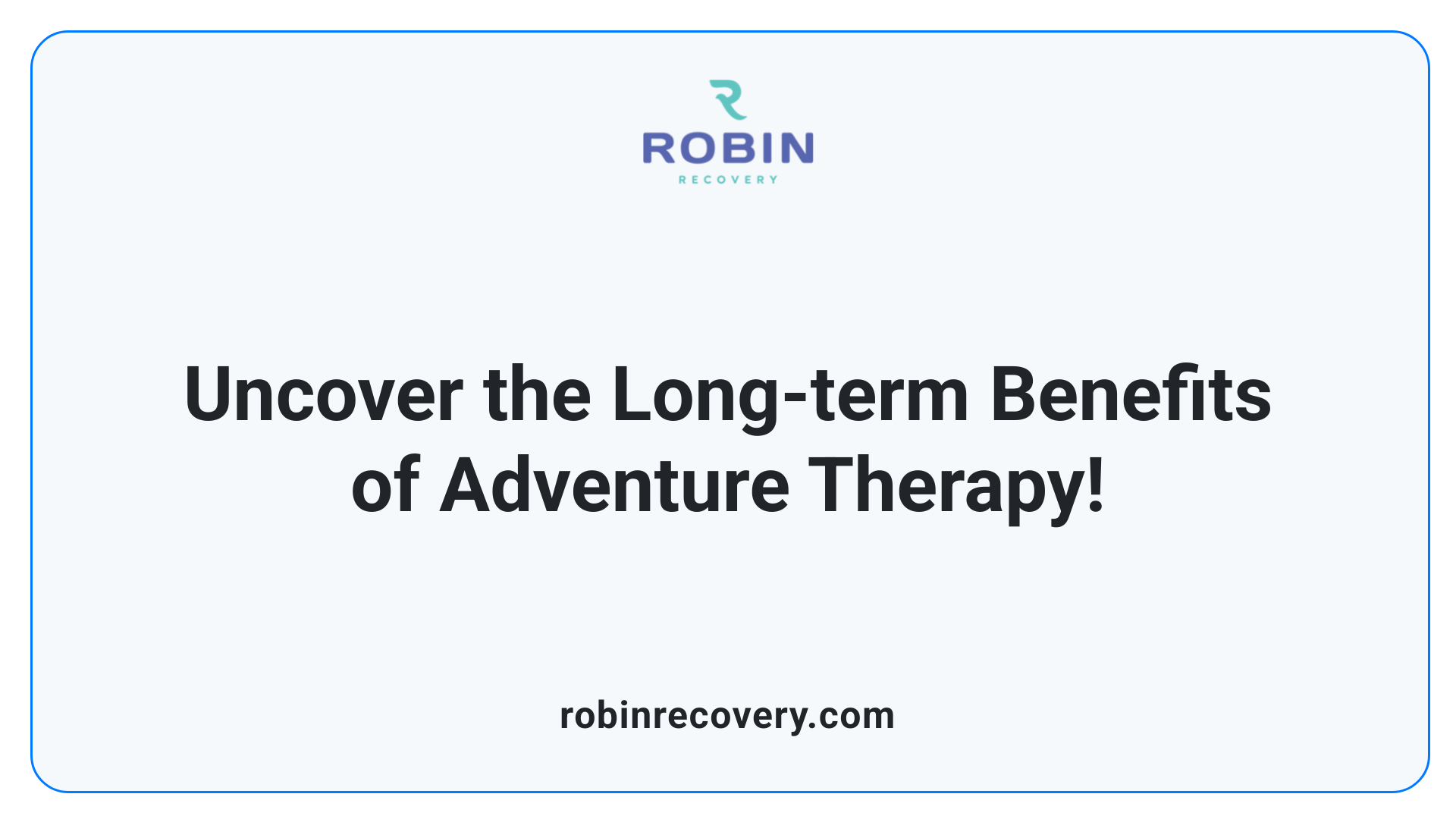The Benefits of Adventure Therapy in Addiction Recovery

Understanding Adventure Therapy and Its Role in Recovery
In recent years, adventure therapy has gained traction as an innovative approach to tackling addiction and its associated challenges. As individuals seek to break free from the grip of substance abuse, traditional talk therapies sometimes fall short. This creates an opportunity for action-oriented and experiential therapies that engage the mind and body through nature and structured activities. This article delves into the benefits of adventure therapy in addiction recovery, offering insights into how this unique therapeutic approach can facilitate healing and promote lasting change.
Defining Adventure Therapy in Addiction Recovery

What is adventure therapy in addiction recovery?
Adventure therapy in addiction recovery is a specialized form of behavioral psychotherapy that merges engaging outdoor activities with therapeutic practices. This approach utilizes team-based exercises alongside challenging physical obstacles to foster personal growth. Facilities like Luminis Health offer programs where participants engage in activities such as ropes courses and climbing towers. These activities are designed to help individuals rebuild trust in themselves and others, which is crucial in overcoming substance use issues.
Components and principles of adventure therapy
The principles of adventure therapy center on action-oriented experiences, fostering unfamiliar environments, and promoting change through direct involvement. Key components include:
- Team-based exercises: Encouraging collaboration among participants.
- Challenging activities: Incorporating perceived risks that enhance personal and social development.
- Psychological support: Provided by trained professionals to ensure the therapeutic process is effective.
- Adaptability: Programs accommodate participants of varying physical capabilities.
Specific benefits of adventure therapy in addiction recovery
Adventure therapy yields numerous benefits that significantly impact recovery:
- Enhanced self-esteem: Participants often feel accomplished as they tackle challenges.
- Improved communication skills: Group activities foster open dialogue and interpersonal skills.
- Healthy coping strategies: Individuals learn to replace negative behaviors with positive ones.
- Community support: The group dynamic creates a sense of belonging that combats isolation.
- Stress relief: Nature exposure during these activities is proven to lower cortisol levels, promoting mental clarity.
Overall, adventure therapy provides a comprehensive and engaging alternative to traditional treatment, addressing both substance use disorders and underlying mental health issues.
Techniques Used in Adventure Therapy for Positive Change

What techniques are used in addiction recovery to promote positive change?
Adventure therapy incorporates several engaging techniques to foster positive change in individuals recovering from addiction. Among the most effective methods are positive affirmations and visualization. These techniques help participants build a positive mindset, which is crucial for overcoming addiction by enhancing self-efficacy and emotional resilience. By focusing on strengths rather than weaknesses, individuals can foster healthier decision-making processes.
Therapeutic approaches like Cognitive Behavioral Therapy (CBT) and Dialectical Behavior Therapy (DBT) play significant roles as well. These methods address negative thought patterns, providing tools to alter unhelpful behaviors and manage emotions more effectively. For instance, participants in adventure therapy might engage in activities that encourage reflection and emotional expression, allowing them to confront feelings that contribute to their addiction.
Another vital component is the practice of creating realistic goals. Participants learn to set achievable objectives during activities like hiking or rock climbing, which enhances their sense of accomplishment and self-worth. This not only boosts morale but also cultivates accountability and commitment to recovery.
Furthermore, adventure therapy emphasizes building supportive communities. By participating in group activities, individuals form connections that can help sustain motivation and support through difficult times. This overarching network of positive reinforcement is fundamental in navigating the recovery process.
The Effectiveness of Adventure Therapy Compared to Traditional Therapies

How effective is adventure therapy in treating addiction compared to traditional therapy?
Adventure therapy presents a compelling alternative to traditional therapies for treating addiction. It engages participants through hands-on experiences, fostering a transformation in self-concept, self-esteem, and pro-social behavior. Unlike conventional therapies, which often emphasize talk and introspection, adventure therapy utilizes experiential learning. Activities like hiking, rock climbing, and team-building exercises push individuals to confront challenges, thereby deepening their engagement in the recovery process.
The established roots of adventure therapy, grounded in cultural practices and programs like Outward Bound, reinforce its relevance in personal development. Research findings, including meta-analyses, indicate that adventure therapy not only addresses addiction but also alleviates symptoms of depression and anxiety, making it a robust option for many individuals. Studies show that participants often report significant improvements in coping abilities and social skills, vital for sustained recovery.
Unique benefits and challenges of adventure therapy
One of the unique benefits of adventure therapy is that it encourages the development of essential life skills within real-world contexts.
Benefit Details Improved Self-Esteem Engaging in challenging activities boosts confidence. Enhanced Coping Strategies Participants learn effective ways to manage stress. Increased Social Connections Cooperative tasks foster teamwork and support. Holistic Approach Integrates physical, emotional, and cognitive growth.
Despite these advantages, adventure therapy may not suit everyone. Individuals with specific health concerns may need adaptations to participate.
In summary, adventure therapy offers a dynamic and effective approach to addiction recovery that complements traditional methods, enriching the therapeutic experience through experiential learning.
Key Activities in Adventure Therapy
Outdoor Activities Utilized in Therapy
Adventure therapy integrates various outdoor activities to facilitate healing and personal growth. Common activities include:
- Hiking: Promotes physical fitness and enhances cardiovascular health.
- Camping: Offers participants a sense of community and teamwork.
- Rock Climbing: Develops confidence and problem-solving abilities.
- Water Sports (like kayaking and surfing): Encourages risk-taking in a safe environment.
- Team-Building Exercises: Foster cooperation and communication among participants.
Role of These Activities in Skill Development
These activities play a vital role in developing essential life skills. They help participants:
- Enhance Communication Skills: Engaging in group activities improves interpersonal communication.
- Build Trust and Resilience: Overcoming physical challenges fosters belief in one's abilities.
- Learn Effective Coping Strategies: Handling the unpredictability of outdoor activities equips individuals with techniques to manage stress and anxiety.
Experiential Learning Benefits
Adventure therapy’s experiential approach promotes:
- Increased Self-Efficacy: Completing challenges leads to greater confidence.
- Holistic Growth: Combines physical, emotional, and social development, crucial for recovery.
- Mindfulness: Nature exposure instills a sense of peace and helps manage intrusive thoughts.
Overall, adventure therapy provides a transformative experience that can significantly aid individuals in their recovery journey.
Psychological and Social Benefits of Adventure Therapy
Impact on mental health and social skills
Adventure therapy combines outdoor activities with psychological interventions, significantly impacting individuals recovering from addiction. Research indicates that engaging in such activities fosters improved mental health by reducing symptoms of anxiety and depression. Participants learn to confront both physical and emotional challenges through hands-on experiences like hiking, rock climbing, and team-building exercises. This not only enhances their emotional regulation but also equips them with vital life skills like effective communication and trust-building, which are crucial for long-term sobriety.
Adventure therapy for anxiety and depression
A distinctive aspect of adventure therapy is its ability to provide rejuvenating experiences in nature, which supports mental health recovery. Immersing oneself in natural settings has been shown to lower cortisol levels and alleviate anxiety. The practice of 'Shinrin-yoku' or 'forest bathing' exemplifies how nature exposure can lead to increased peace and mental clarity, further aiding individuals in processing overwhelming emotions and reducing feelings of isolation commonly experienced in recovery.
Building a supportive recovery community
Engagement in outdoor activities not only promotes individual growth but also facilitates the formation of a supportive recovery community. By participating in group adventures, individuals connect with like-minded peers, thereby enhancing their sense of belonging. This social interaction is vital for establishing a network of shared experiences, fostering teamwork, and creating lasting relationships that contribute positively to the recovery journey.
Customization and Accessibility in Adventure Therapy

Adapting Therapy for Different Physical Abilities
Adventure therapy recognizes that not everyone has the same physical capabilities. Programs can be tailored to accommodate individuals with disabilities or those who prefer less physically demanding activities. For instance, simpler activities such as nature walks or bird watching can easily replace more rigorous pursuits like rock climbing, ensuring everyone can engage at a comfortable level.
Inclusivity in Therapy Programs
Inclusivity is fundamental in adventure therapy, allowing individuals from various backgrounds to share in the experience. Programs often involve team-building exercises that cater to all therapists' skill levels and backgrounds, promoting group cohesion. Activities can be adjusted dynamically based on participants' comfort and capability, enhancing connection and collaboration.
Addressing Individual Needs and Preferences
Each individual's journey through addiction recovery is unique. Adventure therapy involves initial assessments that help tailor activities to suit personal goals and interests, enabling participants to immerse themselves in ways that resonate with them. This personalized approach ensures that everyone can find joy, purpose, and healing within nature's embrace, leading to a more impactful recovery experience.
Long-term Impact and Personal Growth through Adventure Therapy

How does adventure therapy promote sustainability and relapse prevention?
Engaging in adventure therapy fosters a sustainable recovery environment by integrating coping strategies with physical activities. Participants learn how to manage triggers and stressors in a safe setting, enabling them to develop healthy habits that persist long after treatment.
Additionally, outdoor activities like hiking or rock climbing provide constructive outlets for emotions, promoting resilience and reducing the risk of relapse. Overcoming physical challenges builds self-esteem, crucial for maintaining recovery.
In what ways does adventure therapy encourage responsibility and self-discovery?
Adventure therapy emphasizes personal responsibility, pushing individuals to take ownership of their recovery journey. This ownership translates into developing problem-solving skills as clients face challenges during therapy sessions, encouraging them to navigate life's hurdles more effectively.
Moreover, engaging in outdoor activities aids individuals in self-discovery, enabling them to identify personal strengths and weaknesses. The experiential learning approach encourages emotional expression and greater self-awareness, vital for fostering personal growth.
What role does adventure therapy play in supporting lifelong recovery?
Through its focus on building social connections and teamwork, adventure therapy contributes significantly to lifelong recovery. Activities conducted in a group setting help participants create supportive networks, essential for long-term sobriety.
The principles of trust and cooperation foster a sense of community, helping individuals feel less isolated. Moreover, skills gained through adventure therapy enhance personal development, creating opportunities for continuous growth and fulfillment in life beyond addiction.
Adventure Therapy: A Pathway to Renewed Hope and Healing
Adventure therapy stands out as a groundbreaking approach that harnesses the power of nature, physical challenge, and experiential learning to aid in addiction recovery. By stepping outside their comfort zones, individuals develop resilience, improve mental health, and foster invaluable social connections—key elements for lasting recovery. As the therapy continues to evolve, its ability to meet individuals where they are on their recovery journey makes it an invaluable option for anyone seeking a transformative healing experience. Embracing both the journey and the destination, adventure therapy offers a promising pathway to renewed hope and healing for those facing the challenge of addiction.
References
- Benefits of Wilderness Activities in Addiction Treatment
- 3 Benefits of Adventure Therapy for Addiction - Los Angeles
- Adventure Therapy as Addiction Treatment - Footprints to Recovery
- The Benefits of Adventure Therapy - Eagle Creek - Idaho
- Adventure Therapy and Youth in Addiction Recovery
- Adventure Therapy: A Surprising Solution for Addiction
- Adventure Therapy: The Benefits of Recovery Activities - Laguna
- The Benefits of Adventure Therapy Programs | Next Step Recovery
- Benefits Of Adventure Therapy In Addiction Recovery
